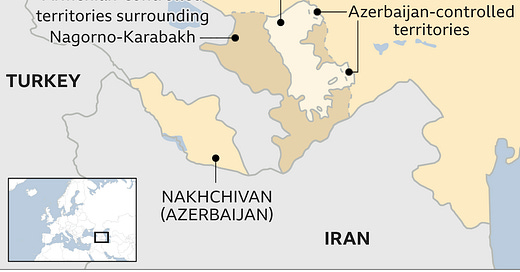Armenian and Azerbaijanian forces have been fighting in the Nagorno-Karbakh Line of Contact for over a month.
Hundreds of army men and civilians have died in this conflict, which is possibly the biggest escalation in the decades-old fight between the two countries.
Some background
The Nagorno-Karabakh region is recognised as a part of Azerbaijan but is controlled by ethnic Armenians.

Both countries were a part of the Soviet Union when it was formed in the 1920s. Even though the area was an ethnic Armenian-majority nation, its control was given to Azerbaijan.
This led to several clashes between the ethnic groups and the authorities, and finally a full-blown war in the 1980s after Armenia and Azerbaijan declared independence from Moscow, and the Soviet Union was collapsing.
After a Russian-brokered ceasefire deal in 1994, Nagorno-Karabakh remained part of Azerbaijan, but since then has mostly been governed by a separatist, self-declared republic, run by ethnic Armenians and backed by the Armenian government.
Geopolitics
Turkey supports Azerbaijan and has no official relations with Armenia. In 1993, Turkey shut its border with Armenia in support of Azerbaijan during the war over Nagorno-Karabakh. Currently, Turkey has openly backed Azerbaijan and blamed Armenia for the renewed fighting.
Russia meanwhile has good relations with Armenia, and also has a military base in the country. However, President Vladimir Putin also has good relations with Azerbaijan.
Present Situation
Presently, both sides have claimed a truce violation after a second attempt at a ceasefire was announced on Saturday (17th October). This cease-fire was allegedly broken within minutes of being put into effect on midnight. The first attempt at a cease-fire was made by a Russian-brokered deal on 10th October.
The decision of implementing a cease-fire was made by the OSCE Minsk Group.
OSCE Minsk Group
The OSCE Minsk Group is co-chaired by France, the Russian Federation and the United States. The group has been working on resolving the conflict between the two countries since 1992.
The co-chairs called on the Azerbaijani President Ilham Aliyev and Armenian Prime Minister Nikol Pashinyan to "take immediate steps to execute in full the obligations of the sides according to the October 10 Moscow statement, in order to prevent catastrophic consequences for the region."
Does this remind you of a similar situation with two neighbouring countries claiming their rights over a state and external countries trying to broker a peace deal?
With 2020 peaking, could any of these disputes be a prelude to WW3?



